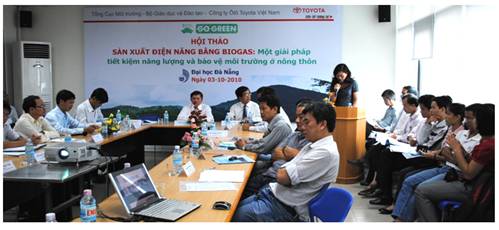GO GREEN
PILOT PROJECT
ELECTRICITY PRODUCTION BY BIOGAS

Energy is the first concern of the human beings in the 21st century. Fossil fuel source is being exhausted and becomes a discerning issue in the international political situation. Continuous increase in rude oil price in recent years (over 125USD/barrel in May 2008) shows a big instability in the world economy highly depending on oil.
Air pollutants caused by burning fossil fuels (coal, oil, gas…) threaded life of human being long time ago. In discharged gas, there are some substances very dangerous for human health as CO, HC, NOx, SO2, soot…and badly impact on environment, especially CO2, a green house gas increasing global temperature. There are a lot of international and regional conferences talking about the solutions to reducing CO2 in production and living activities, and there are several of international conventions being made in such conferences as Kyoto, LaHaye, Bali, Copenhagen… Vietnam has committed to implement as well. According to these conventions, the nations should apply solutions to reducing CO2 by using clean and renewable energy. Renewable energy generated from solar energy is the most ideal one.
Research on using of renewable energy has attracted attention of scientists for long time, especially after oil crisis in 1973. As vegetable oil, biogas is a fuel neutralizing CO2 in atmosphere. Biogas is a result of decomposing orga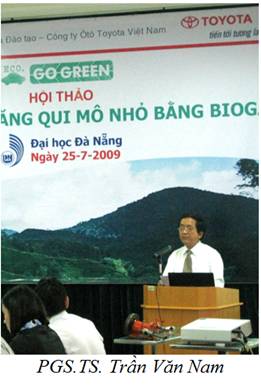 nic substances in anaerobic conditions. Organic substances can be plants (trees, straws…) or animals (dead animals, discharged substances from food processing…), wastes from breeding. Chlorophyll process of plants under sunlight receives CO2. CO2 generated by burning plants will be absorbed by living plants; therefore, CO2 amount in atmosphere will be balanced. There are two main sources of biogas: one from biogas digesters (tanks) and one from the organic substance fermentation under anaerobic conditions in landfills. Biogas contains mainly CH4 (50-70%) and CO2 (25-50%) and other impurities as H2S. If biogas is refined from the above substances, we will have fuel with property as natural gas. Developed countries such as USA, France, Germany, Denmark…all use biogas from landfills to generate electricity. Biogas production technology in household scale is popular in developing countries, especially in India and China. In our country, several projects in electricity production from biogas gained in landfills have been made.
nic substances in anaerobic conditions. Organic substances can be plants (trees, straws…) or animals (dead animals, discharged substances from food processing…), wastes from breeding. Chlorophyll process of plants under sunlight receives CO2. CO2 generated by burning plants will be absorbed by living plants; therefore, CO2 amount in atmosphere will be balanced. There are two main sources of biogas: one from biogas digesters (tanks) and one from the organic substance fermentation under anaerobic conditions in landfills. Biogas contains mainly CH4 (50-70%) and CO2 (25-50%) and other impurities as H2S. If biogas is refined from the above substances, we will have fuel with property as natural gas. Developed countries such as USA, France, Germany, Denmark…all use biogas from landfills to generate electricity. Biogas production technology in household scale is popular in developing countries, especially in India and China. In our country, several projects in electricity production from biogas gained in landfills have been made.
Biogas is today more and more popular in rural regions of Vietnam. It contributes to resolve two problems related to environment protection and energy in the regions where more than 80% Vietnamese population live. Biogas is actually often used for cooking. But farmers need also energy for their production, particularly in family scale. Thus small power internal combustion engines fueled with biogas for producing electricity, pumping, milling… are very useful to improve quality of life and production in these areas.
Biogas cleaned-up by treatment systems is necessary for fueling internal combustion engines. Such biogas may be withdrawn from large-size treatment systems like landfills. Unfortunately, the stationary biogas fueled engines available in our markets are mostly large-power series and much more expensive than the same power ones that are fueled with the traditional fuels. Therefore, study on designing an appropriate system fueling biogas to small-power engines is an urgent task of dealing with the energy shortage in rural areas.
The University of Danang has carried out the research of application of different gas fuels on engines: LPG on automobile and on motorcycle, biogas on stationary engines. Our petrole/gas conversion kits for different kind of engines are now available and they are applied successfully in pratice. The multiplication of application of the solution would be very useful either on energy economic and on environment protection.
A small scale pilot project for demonstration is necessary to push up the large application of renewable energy.
Main objective of the project is to promote application of biogas on small power engines which are frequently used in rural region of Vietnam in view of economy energy and environment protection.
Concrete objective of project is to develop small scale pilot project of 25 biogas engines in different provinces of the country for presenting to public the effectiveness of application of biogas on engine in view of multiplication of the solution for large application.
Content of the pilot project:
– Installation of biogas conversion kit on 24 groups engine-generator of 3 kW
– Installation of biogas conversion kit on 26 groups engine-generator of 5 kW
– Installation of biogas conversion kit on 4 groups engine-generator of over 20 kW
– Prototype of a nylon biogas digester, H2S filtration and gas storage bag
– Marketing of the project
– Customer meeting
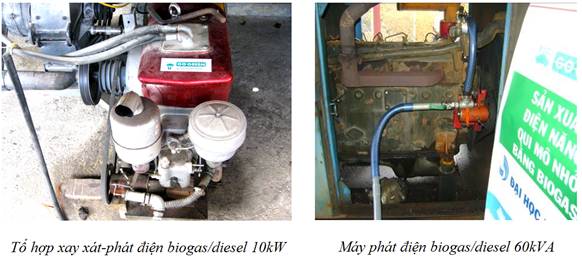
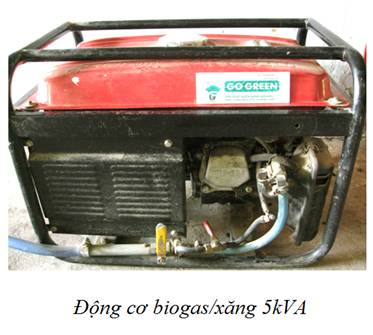
– Economy impact
Biogas consumption is about 1m3 for 1kWh electricity.
The 5kW diesel engine consumes 10 liters of petrol in 6 hours. If it runs 6h/day on biogas, the owner can save 2 millions VND/month or 24 millions VND/year.
The owner can take enough money of investment for the biogas conversion kit after 2 months of function.
If we use 10,000 similar biogas engine groups, we can save 240 billiards VND per year.
– Environment impact
CO2 emission of combustion diesel fuel is 2,64kg/liter.
The above 5kW diesel engine runs 6h/day emits 26.4 tons CO2 per day or 9.5 tons CO2 per year.
So, if the engine runs on biogas, we can reduce CO2 emission about 9.5 ton par year.
If we use 10.000 similar biogas engine groups, we can reduce 95.000 tons CO2 emission per year. This is considerable contribution to global warming mitigation.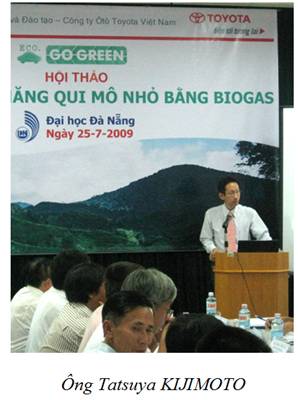 .
.
– Mr. TATSUYA KIJIMOTO, Deputy Director of Marketing, TOYOTA Việt Nam
First of all, on behalf of Toyota Motor Vietnam, I would like to send my sincere thanks to the leaders of the University of Danang for cooperation with our company in the social contribution activities, especially in environmental protection activities throughout time.
In recent years, environmental issues and sustainable development are increasingly attracting the attention and become the key issues that need to be considered and priorities of most countries on the planet, including Vietnam.
Committed to community responsibility and realize the importance of the dissemination of knowledge about environmental protection in the community, Toyota Motor Vietnam has cooperated with the Ministry of Education and Training and the Department of Environmental Protection initiated and implemented the program GO GREEN from June 2008 with a series of practical activities, including directly or indirectly for the purpose of constructing a green Vietnam and sustainable development.
In the framework of the Go Green, TMV supports implementation of the pilot project to convert traditional engines to biogas engines of the research team at the University of Da Nang.
We really hope that, with the successful implementation of this project, we will contribute to the development of biogas energy a powerful way to save fossil fuels and environmental protection.
Join hands to keep a green bright Vietnam, to come forward to the future and sustainable development.
– Mrs. Lê Thị Hương Dịu, Head PR, Toyota Việt Nam,
Program GO GREEN in Vietnam has good development, achieving its goals. We highly appreciate the results of pilot project “small-scale power production by biogas” that UD research team is conducting with the support of GO GREEN
